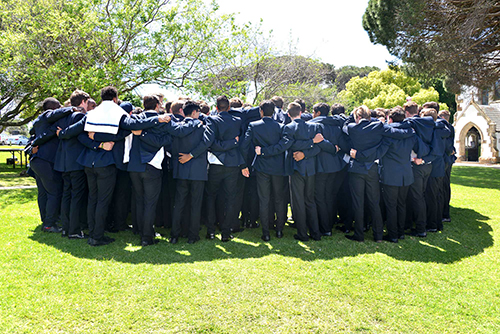Tutor System

Houses are divided into 5 or 6 vertical tutor or family groups with approximately 16 boys within each group. All of the tutors attached to each House are teachers at the school. Each tutorial group within the house is a microcosm of that house and comprises boys from all grades 8 to 12. This is to create a more family feel to tutoring, where the older boys start to learn to take care of the younger members and the grade peer groups are broken up to help boys share more openly. The House Director does not tutor but is responsible for the administration and guidance of the tutors and the tutor groups within their House. While the House Director is ultimately responsible for the welfare of the boys in the House, the tutor can be especially aware of each boy’s progress and is often the first point of contact when a parent wishes to communicate with the School. It is intended that each boy stays in the same Tutorial group for the whole of his college career and all routine teacher and parent communication should go through that tutor. This would enable tutors to get to know each boy as an individual and to better guide him throughout his College years. The tutor would come to know the family context and each boy’s unique place within the House and school. Parents would get to know their son’s tutor over the five years and this would help develop the essential partnership between the tutor and the parent.
On Monday, Thursday and Friday, after chapel, there is a short meeting of the tutorial group directly prior to boys going to formal classes. The period is primarily for personal contact and relationship building; not only for the tutor but also for all the tutees to get know each other across the grades. For new grade 8 boys the transition to a large complex secondary school is facilitated and monitored primarily through the House and Tutor group. A senior boys in each House act as a ‘mentor’ for a new boy in their House and Tutor group. They are there to assist them to settle down at the start of the year.
As time passes the tutor gets to know about the various aspect of each boy’s life and is able to engage with the boy directly or work with other role players to bring about any interventions necessary. The tutor does not often directly help a boy with his work. That is the role of the individual teachers.
The Role of the Tutor
Tutors are a significant building block in the life of the tutee in that they encourage boys to discuss their development, attitudes, observations and beliefs within a safe environment. The tutor’s role is to come to understand the broad life-picture of each of their tutees: the boy's goals and values, his home and family life, his relationships with others in the school community, his commitment to and involvement in the curricular and extracurricular life of the School. The tutor tries to listen, to counsel, and to encourage and reproach in appropriate doses. Tutors like the freedom to manage their tutor groups around their own interests, styles and experiences. Nevertheless, during their tutorial times they are expected to:
-
Get to know the boy - In a community where every day each boy moves from teacher to teacher, the Tutor is a constant in the boy's school life. They are in a position of influence. In aiming to get to know the boy as an individual, as a member of his family, and as a member of the School, the Tutor actively needs to show interest in him, his activities and his family. The tutor has access to each of their tutees personal profiles on the school database. This powerful tool has proved invaluable to developing a window onto each boy’s busy life at Bishops. A boy’s parents can access this information (with the use of a confidential password) through the MyBishopsLife tab on the Bishops webpage.
-
Monitor - Tutors monitor each boy's progress and development through discussions with him, access to his marks, communications with his teachers and observations of the boy in different contexts.
-
Consult on and refer pastoral issues - Tutors need to be sensitive to ‘signals’ from the boys and draw in the House Director, counsellor or chaplain where necessary. The staff team in each House can help in a myriad of ways, whether it is advice on how to manage behavioural problems or devising strategies to deal with particular academic situations. The experience of the House Director is a valuable resource for Tutors.
-
Maintain communication with parents – As the primary point of contact with the parents, a tutor can keep parents informed of each boy's progress and development, listen to the concerns of parents, discuss options with them, and seek their co-operation in strategies to support boys to attain realistic goals. The tutor will write a short report in each Industry Report and a larger Tutor Report once a year for each boy.